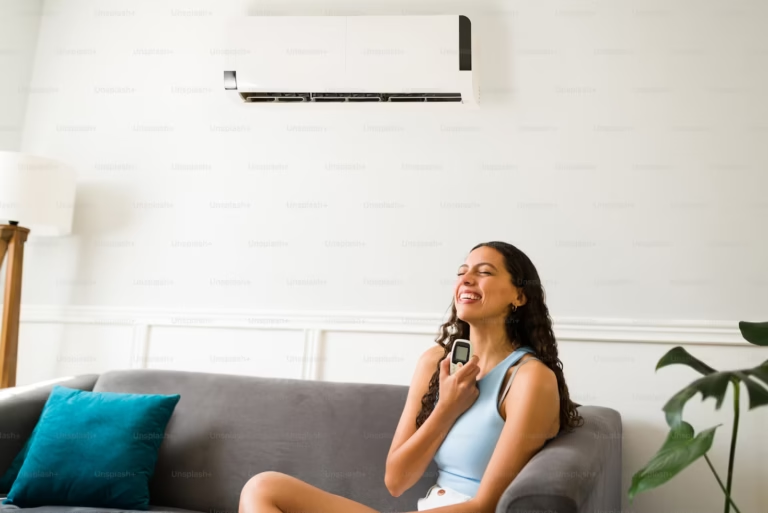Using an air conditioner is essential during hot summer months, but it can significantly increase your electricity bill if not used wisely. Fortunately, there are several simple and effective strategies you can follow to save energy while staying cool and comfortable.
In this guide, we’ll cover the best energy-saving tips for air conditioners, whether you’re using a split system, window unit, or central air conditioning.
1. Choose the Right AC Size for Your Room
One of the most common reasons for excessive power consumption is using an air conditioner that is either too small or too large for the space.
AC Sizing Guide (General Rule):
- Up to 120 sq. ft. – 1 Ton
- 120–180 sq. ft. – 1.5 Ton
- Above 180 sq. ft. – 2 Ton
An oversized unit will cool the room quickly but cycle on and off frequently, wasting energy. An undersized unit will run continuously without effectively cooling the space.
2. Invest in an Inverter AC
If you’re buying a new air conditioner, consider choosing an inverter AC. These units use variable-speed compressors that adjust their output based on cooling needs, leading to significantly lower electricity usage.
Benefits:
- Up to 30–50% more efficient than non-inverter models
- Maintains consistent temperature
- Reduces wear and tear
Look for 5-star rated inverter ACs for maximum energy savings.
3. Set the Thermostat Wisel
Every degree matters! The ideal temperature setting for energy efficiency is between 24°C and 26°C (75°F to 78°F). Many people make the mistake of setting their ACs to 18°C, thinking it will cool faster—but that only increases power usage.
Tip:
Set your AC to 26°C when you’re at home and 28°C when you’re away for short periods. Use sleep mode at night to adjust temperature gradually as your body needs less cooling.
4. Use Ceiling or Table Fans with Your AC
Fans use very little electricity and help circulate cool air more effectively, allowing you to set your thermostat a few degrees higher without sacrificing comfort.
Fan + AC Combo:
- Set the fan to rotate counterclockwise (summer mode).
- Position the fan to push cool air down and around the room.
5. Maintain Your AC Regularly
Dirty filters, clogged coils, and blocked vents make your air conditioner work harder than necessary, using more energy.
Maintenance Tips:
- Clean or replace filters every 1–2 months.
- Check for refrigerant leaks annually.
- Clean condenser coils before and after each cooling season.
- Ensure unobstructed airflow around the indoor and outdoor units.
Regular maintenance can improve efficiency by up to 15%.
6. Seal and Insulate Your Room
If cold air is escaping and hot air is getting in, your AC has to work overtime. Simple insulation and sealing measures can significantly reduce energy waste.
What to Do:
- Seal gaps around windows and doors with weather stripping or caulk.
- Use thick curtains or blinds to block direct sunlight.
- Install door sweeps to block gaps beneath doors.
7. Avoid Heat-Generating Activities During the Day
Cooking, ironing, or using heat-producing appliances during the day increases your room’s temperature and makes your AC work harder.
Energy-Saving Habits:
- Cook during early morning or late evening.
- Use a microwave or pressure cooker instead of the oven.
- Turn off lights, TVs, and other electronics when not in use.
8. Use Smart Features and Timers
If your AC has a smart thermostat, timer, or scheduling feature, make the most of it. These functions help you optimize usage and reduce unnecessary operation.
⏱️ Set Timers For:
- Turning the AC off an hour before you wake up.
- Pre-cooling your room 30 minutes before you arrive home.
- Automatic shutoff when you leave the house.
Smart ACs can also be controlled via smartphone apps or voice assistants, giving you real-time energy management.
9. Shade the Outdoor Condenser Uni
The condenser outside your home works better when it’s not exposed to direct sunlight. Shading it can improve efficiency by up to 10%.
Tips:
- Place the condenser under a tree or install an awning.
- Make sure there’s at least 2 feet (0.6 meters) of clearance around the unit.
- Avoid placing plants or objects too close to obstruct airflow.
10. Upgrade to Energy-Efficient Models
Older ACs consume significantly more electricity than modern models. If your unit is over 8–10 years old, it may be time for an upgrade.
Look for:
- Inverter compressor
- 5-star BEE rating (India) or SEER rating of 16+ (USA)
- Models using R32 or R410A refrigerants, which are more eco-friendly
11. Turn Off the AC When Not Needed
Sounds obvious, but many people leave their ACs running unnecessarily. Turning off your unit for even an hour a day can lead to significant savings over time.
Tips:
- Turn off the AC when you leave the room for more than 30 minutes.
- Use a programmable thermostat or smart plug to automate shutoff.
12. Consider Using Solar Panels
If you live in a region with ample sunlight, installing solar panels can help offset the energy cost of running your AC, especially during peak hours.
While the upfront cost is high, the long-term savings are considerable, and government subsidies or tax rebates may be available.
Conclusion
Air conditioning doesn’t have to be expensive. By following these air conditioner energy-saving tips, you can dramatically reduce your power consumption without compromising comfort. A combination of smart habits, regular maintenance, and efficient technology can help keep your home cool and your energy bills low.

